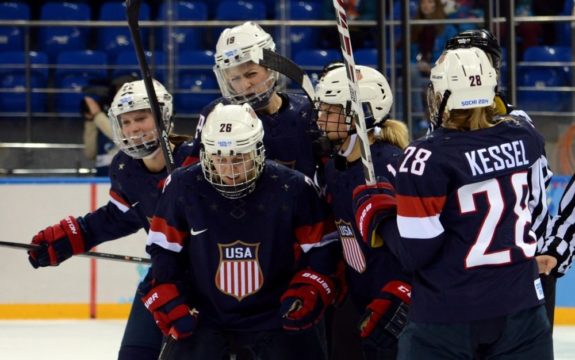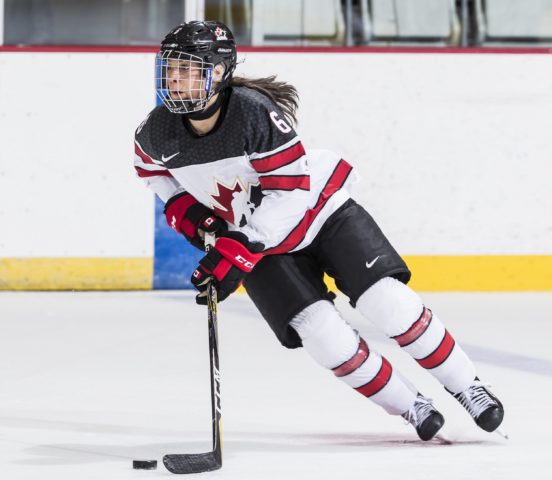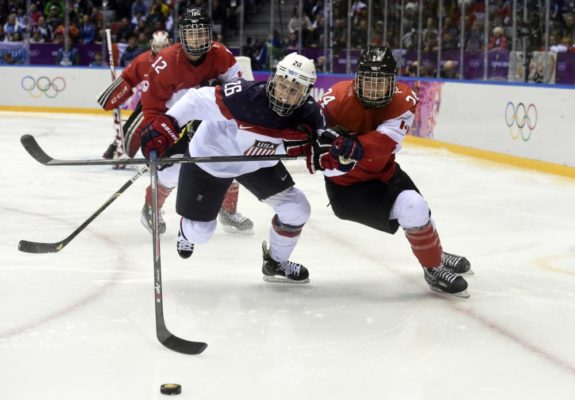Kendall Coyne Schofield wasn’t the only female hockey star to nearly break Twitter this weekend.
Yes, the 26-year-old Minnesota Whitecaps forward and USA Hockey Olympic gold medalist became the first woman to take part in the NHL All-Star Skills competition on Friday night, after she was a last minute replacement for banged up Colorado Avalanche forward Nathan MacKinnon. Coyne Schofield excelled in the competition, out-skating Arizona Coyotes forward Clayton Keller with a time of 14.346 seconds. That time was also less than a second slower than the fastest player in the NHL, Connor McDavid, who won the event for a record third consecutive year with a time of 13.378.
Fellow U.S. Olympian Brianna Decker also impressed during the festivities, setting social media on fire for a second time, but this time with some backlash.
Decker Appears to Record Fastest Time in Passing Event
As a “demonstrator” for the passing event, Decker, currently a forward for the Calgary Inferno of the Canadian Women’s Hockey League, appeared to complete the premier passing obstacle in one minute and six seconds. As it turns out, none of the eight NHL participants beat that time. Six of them actually took longer than 1:25 to finish the drill. Edmonton Oilers forward Leon Draisaitl “won” the event with a time of 1:09.

At the time, Decker’s impressive time was not officially recognized because it was not timed by the NHL and wasn’t even broadcast on NBC Sports in the United States. Instead, her time was clocked by fans on social media. (It turns out Decker’s official time was “around 1:12-13”, which Sportsnet’s Elliote Friedman tweeted out on Saturday night). Because the winner of each of these skills events gets a cheque for $25,000 (USD), Twitter blew up on Saturday, calling for Decker to be given what she deserves.
CCM Hockey Announces They Will #PayDecker
As you can imagine, Decker got a ton of support online the following day, especially considering Draisaitl earns a salary of $9 million this season and another $50 million over the next six seasons. For comparison sake, the CWHL salary cap per team is only $100,000.
https://twitter.com/ashmeads2/status/1089061007845179392
For most of Saturday, the hashtag #PayDecker was trending across Canada.
https://twitter.com/nnstats/status/1089201899029651459
In an effort to take full advantage of a PR opportunity, hockey manufacturing giant CCM Hockey announced on Twitter late Saturday afternoon that they would give Decker the $25,000. Their note thanked the 27-year-old for helping to grow women’s hockey.
We’re gonna #PayDecker. pic.twitter.com/TbWSD7NAQP
— CCM Hockey (@CCMHockey) January 26, 2019
Decker thanked them back, saying they have been nothing but first class in the five years she has been with the company, adding, “Thank you for supporting the men’s and women’s game equally!”
NHL Misses Opportunity
Coyne Schofield and Decker were just two of four professional female players to help out at all-star weekend. Canadian Renata Fast helped preview the accuracy shooting and fellow Canadian Rebecca Johnston was the first to go through the puck control contest. Last season, U.S. Olympians Amanda Kessel, Meghan Duggan and Hilary Knight demonstrated events prior to the event in Tampa.
For a league that has trademarked the phrase “hockey is for everyone,” including women in a marquee event is a good step forward, but it’s not enough.
My first question: why are they only demonstrating? Is it so hard to have all four actually compete? Why not invite more than four women to take part? Or why not have the women compete in multiple events, like the players? I, for one, was absolutely blown away that Coyne Schofield beat Keller, who is probably most known for his speed, and finished so close to the fastest skater in the league. I would love to see more of the game’s top female athletes compete at All-Star weekend.

My second question: why did CCM Hockey beat the NHL to the punch? It took until nearly 5 p.m. eastern time for the hockey manufacturing company to announce they were hopping on the #PayDecker train. It’s nice that a positive social media campaign ended up making a difference, but it shouldn’t have been necessary in the first place.
My third question: Why was their solution to donate $25,000 in each of the four player’s names to the charities of their choice? It’s certainly better than doing nothing, but the league has it backwards: the NHL players that win should have their earnings donated to charity, while the women, who can actually use that kind of money, should be paid themselves (the average annual salary in the CWHL last season was in the $2,000-$10,000 range).
For what it’s worth, Decker told USA Today that the only reason they were there was to promote the women’s game, particularly the three-game USA vs. Canada rivalry series taking place Feb. 12-17. NHL deputy commissioner Bill Daly echoed a similar sentiment, telling Scott Burnside of The Athletic, “The league has always been a big supporter of women’s hockey. We want it to grow and we want it to progress.” (from ‘Kendall Coyne Schofield’s NHL All-Star appearance deserves meaningful follow’ – The AthleticNHL – 1/27/19)
The women’s game in the United States has indeed grown, quite well in fact. In a nine-year span from 2009-10 to 2017-18, USA Hockey saw a 28.7 percent increase in registration among girls and women, from 61,612 female players to 79,355.

In Canada, female registration has actually dropped to its lowest level since 2007-08, when there were 77,461 girls and women playing. Over the pass decade, the numbers have remained fairly stagnant, but last year saw a 5.5 percent drop, from 88,541 registered girls and women in 2016-17 to 83,711 in 2017-18 (Alberta was hit particularly hard, dropping 16.4 percent, from 11,233 to 9,387).
So if Daly and the NHL truly want the women’s game to grow — which currently isn’t happening in Canada — the league can do more, like perhaps helping bridge the gap between two competing professional women’s leagues, the CWHL and the National Women’s Hockey League. That will take some time, but as far as this weekend goes, the NHL failed when given the opportunity.
Let’s hope it doesn’t happen again.